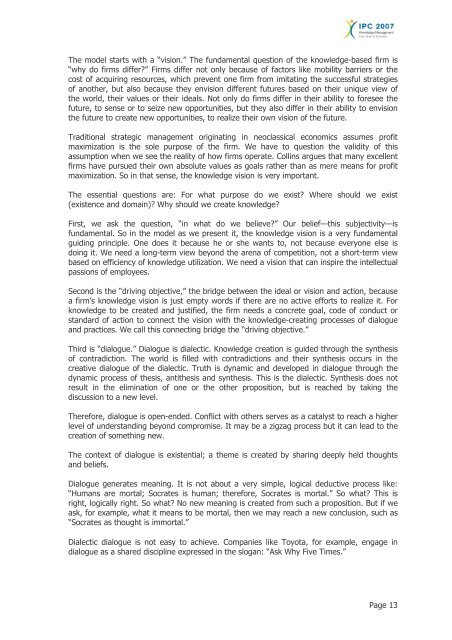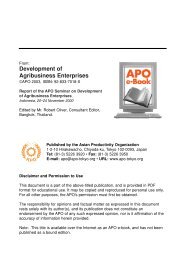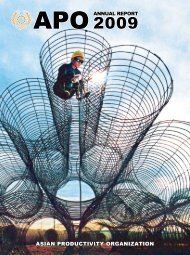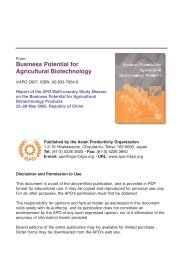Knowledge Management: From Brain to Business (PDF 5.5 - Asian ...
Knowledge Management: From Brain to Business (PDF 5.5 - Asian ...
Knowledge Management: From Brain to Business (PDF 5.5 - Asian ...
You also want an ePaper? Increase the reach of your titles
YUMPU automatically turns print PDFs into web optimized ePapers that Google loves.
The model starts with a “vision.” The fundamental question of the knowledge-based firm is<br />
“why do firms differ?” Firms differ not only because of fac<strong>to</strong>rs like mobility barriers or the<br />
cost of acquiring resources, which prevent one firm from imitating the successful strategies<br />
of another, but also because they envision different futures based on their unique view of<br />
the world, their values or their ideals. Not only do firms differ in their ability <strong>to</strong> foresee the<br />
future, <strong>to</strong> sense or <strong>to</strong> seize new opportunities, but they also differ in their ability <strong>to</strong> envision<br />
the future <strong>to</strong> create new opportunities, <strong>to</strong> realize their own vision of the future.<br />
Traditional strategic management originating in neoclassical economics assumes profit<br />
maximization is the sole purpose of the firm. We have <strong>to</strong> question the validity of this<br />
assumption when we see the reality of how firms operate. Collins argues that many excellent<br />
firms have pursued their own absolute values as goals rather than as mere means for profit<br />
maximization. So in that sense, the knowledge vision is very important.<br />
The essential questions are: For what purpose do we exist? Where should we exist<br />
(existence and domain)? Why should we create knowledge?<br />
First, we ask the question, “in what do we believe?” Our belief—this subjectivity—is<br />
fundamental. So in the model as we present it, the knowledge vision is a very fundamental<br />
guiding principle. One does it because he or she wants <strong>to</strong>, not because everyone else is<br />
doing it. We need a long-term view beyond the arena of competition, not a short-term view<br />
based on efficiency of knowledge utilization. We need a vision that can inspire the intellectual<br />
passions of employees.<br />
Second is the “driving objective,” the bridge between the ideal or vision and action, because<br />
a firm’s knowledge vision is just empty words if there are no active efforts <strong>to</strong> realize it. For<br />
knowledge <strong>to</strong> be created and justified, the firm needs a concrete goal, code of conduct or<br />
standard of action <strong>to</strong> connect the vision with the knowledge-creating processes of dialogue<br />
and practices. We call this connecting bridge the “driving objective.”<br />
Third is “dialogue.” Dialogue is dialectic. <strong>Knowledge</strong> creation is guided through the synthesis<br />
of contradiction. The world is filled with contradictions and their synthesis occurs in the<br />
creative dialogue of the dialectic. Truth is dynamic and developed in dialogue through the<br />
dynamic process of thesis, antithesis and synthesis. This is the dialectic. Synthesis does not<br />
result in the elimination of one or the other proposition, but is reached by taking the<br />
discussion <strong>to</strong> a new level.<br />
Therefore, dialogue is open-ended. Conflict with others serves as a catalyst <strong>to</strong> reach a higher<br />
level of understanding beyond compromise. It may be a zigzag process but it can lead <strong>to</strong> the<br />
creation of something new.<br />
The context of dialogue is existential; a theme is created by sharing deeply held thoughts<br />
and beliefs.<br />
Dialogue generates meaning. It is not about a very simple, logical deductive process like:<br />
“Humans are mortal; Socrates is human; therefore, Socrates is mortal.” So what? This is<br />
right, logically right. So what? No new meaning is created from such a proposition. But if we<br />
ask, for example, what it means <strong>to</strong> be mortal, then we may reach a new conclusion, such as<br />
“Socrates as thought is immortal.”<br />
Dialectic dialogue is not easy <strong>to</strong> achieve. Companies like Toyota, for example, engage in<br />
dialogue as a shared discipline expressed in the slogan: “Ask Why Five Times.”<br />
Page 13
















